9+ Managed Services Agreement Contract Examples
All businesses aim to make a name in their respective industries. Many of them prefer to take a shortcut to success by setting their short-term and long-term goals in an almost impossible manner. Luckily for them, outsourcing service contractors or managed services providers (MSP) exist to give them fit solutions. Through various advanced technologies, these enterprises can remotely provide support to their clients regarding problems that are related to data centers and network securities. But before MSPs can render any service to individuals and organizations, they have to compose a legal document, specifically a service-level agreement (SLA) or contract. Get to know more about such a document for MSPs by flicking through our contract template examples and checking out our relevant article below!
9+ Managed Services Agreement Contract Examples
1. Recruitment Managed Service Agreement Contract
2. Managed Services Agreement Contract Example
3. Energy Management Services Agreement Contract
4. Managed Security Service Agreement Contract
5. Cloud Managed Services Agreement Contract
6. Network Managed Services Agreement Contract
7. IT Managed Services Agreement Contract
8. Management and Administrative Services Agreement
9. IT Managed and Continuity Services Agreement Contract
10. Sample Managed Services Agreement Contract
What Is a Managed Services Agreement Contract?
A managed services agreement contract is a process document that presents and explains a business arrangement between an MSP and its client. The Arts Law Centre of Australia described such a document as a list of promises made by the involved parties. It can be done orally or in written form. The same source affirmed that the latter is the best form with inclusions of signatures of both parties’ representatives. Since the paperwork takes note of the participants’ pledges, its primary function is to protect both the MSP and its client from any form of infringement, making it very important for both of them.
Useful Tips in Contracting
1. Do not sign a contract that you do not understand. The lack of knowledge of the process that you’re getting into can cause significant complications, mostly to your disadvantage. So before signing any, make sure to conduct some research.
2. Don’t sign a contract that you don’t agree with. Mutual agreement between the participants is required for the document to be considered a legal contract. Therefore, you have to make sure that every specification is accepted.
3. Avoid making promises you can’t give. Failure to accord with what’s being promised is a breach of contract. It can lead to disputes which may require costly indemnifications to the non-breaching party. Also, contract fiascos can damage your reputation.
4. Opt for written contracts. As mentioned above, contracting can also be done verbally. However, it provides inadequate proof, making it ineffective in implementing dispute resolution policies. With written contracts, you’ll get to make procedure documentation and performance documentation, which are good verification tools.
5. Save a copy of the process document. Given that contracts are used to protect the participants’ rights on a business arrangement, they must hold multiple copies of the paperwork.
How To Create a Managed Services Agreement Contract
Writing contracts need to be done carefully. The party who made the contract offer has to ensure that the document incorporates the standard-based areas. Also, they have to ensure their conciseness and accuracy. To help you create your planned managed services agreement contract, we’ve prepared our ready-made outline that you can refer to.
1. Give Out the Contract’s Purpose
An MSP offers many services, such as managed networks and infrastructure, managed security, managed support services, and more. Each of these services resolves different issues. So as you write your contract, make sure to start by giving out what type of managed services is being requested by the client. Moreover, contracts can be a service agreement contract, purchase agreement contract, sponsorship contract, a rental contract, or an investment contract. Decide which of these types your contract falls under.
2. Name the Parties
As per the standard documentation procedure, you must not forget to provide the complete names of involved parties. Along with this information, you should be addressing your organization as the contractor and the other party as the client on the later part of your document.
3. Elaborate the Service Offer
After naming the parties, start elaborating on what the requested services include. If your client called for a managed cloud infrastructure service, define what the problems are being experienced in online computations, storage, network, and information technology systems. Then, describe how your organization can resolve the issue.
4. Present Provisions
Once you have successfully elaborated on the service offer, present your company’s terms and conditions. This section should consist of the service’s work schedules, equipment and materials, and a brief overview of how the service will be rendered. Agreement on the ownership of resources should also be discussed in this part.
5. Set Payment Stipulations
You can’t complete your managed services agreement contract without the full details of the payment. Right after presenting the service provisions, set your payment stipulations. In doing so, you must take into account the total cost of the service and how and when the payment will be delivered.
6. Expound the Termination Clause
We never know what can go wrong in your contract. Though we all hope for the contract’s success, it’s better to be prepared with a back-up plan in case things go off-course. This is why a termination clause should be included. It is in this part of your contract where you expound how both parties can get out of the contract if one party failed to comply with the agreed obligations.
FAQs
What are the different types of Managed Services?
Managed Services Providers (MSP) may or may not offer all services. Some only specialize in one. Regardless, it’s best to know the different types of managed services. They consist of the following:
1. Managed Networks and Infrastructure
2. Managed Security
3. Managed Support Services
4. Managed Print Services
5. Managed Cloud Infrastructure
6. Managed Software as a Service (SaaS)
7. Managed Wireless and Mobile Computing
8. Managed Communication Services
9. Data Analytics
10. Managed IT Support
11. Cloud-Based Managed Services
How large is the market for managed services providers?
The global managed services market stood at USD 178.5 billion in 2019 and is expected to grow to USD 309.4 billion by 2025.
What are the biggest managed services companies?
1. All Covered
2. Burwood Group, Inc.
3. Managed Solution
4. Mind Shift
5. Coretillegent
It’s amazing how many people find ways to make use of their talents in information technology. Through their imaginative minds, entrepreneurs and employees alike are experiencing the utmost convenience in performing tasks and improving businesses. Just as Albert Einstein said, “Imagination is more important than knowledge. For knowledge is limited, whereas imagination embraces the entire world, stimulating progress, giving birth to evolution.”
9+ Managed Services Agreement Contract Examples

All businesses aim to make a name in their respective industries. Many of them prefer to take a shortcut to success by setting their short-term and long-term goals in an almost impossible manner. Luckily for them, outsourcing service contractors or managed services providers (MSP) exist to give them fit solutions. Through various advanced technologies, these enterprises can remotely provide support to their clients regarding problems that are related to data centers and network securities. But before MSPs can render any service to individuals and organizations, they have to compose a legal document, specifically a service-level agreement (SLA) or contract. Get to know more about such a document for MSPs by flicking through our contract template examples and checking out our relevant article below!
9+ Managed Services Agreement Contract Examples
1. Recruitment Managed Service Agreement Contract
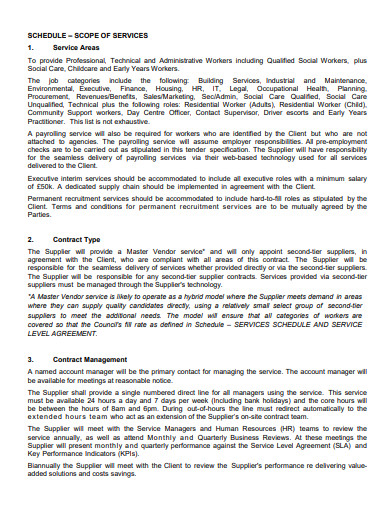
whatdotheyknow.org
Details
File Format
PDF
Size: 184 KB
2. Managed Services Agreement Contract Example
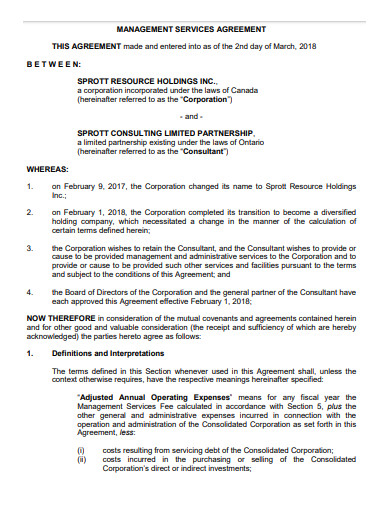
sprott.org
Details
File Format
PDF
Size: 56 KB
3. Energy Management Services Agreement Contract
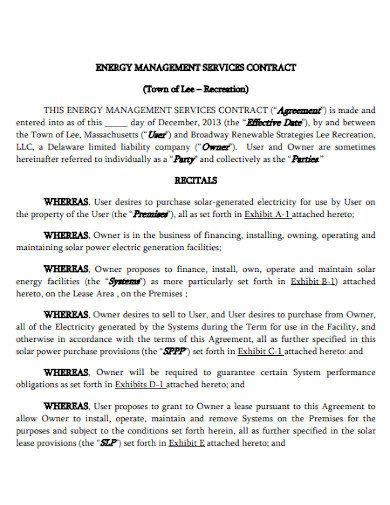
irecusa.org
Details
File Format
PDF
Size: 458 KB
4. Managed Security Service Agreement Contract
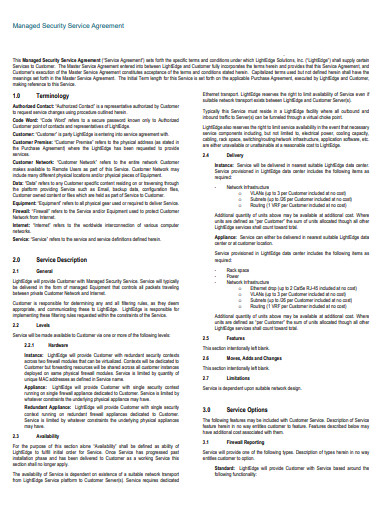
lightedge.com
Details
File Format
PDF
Size: 296 KB
5. Cloud Managed Services Agreement Contract
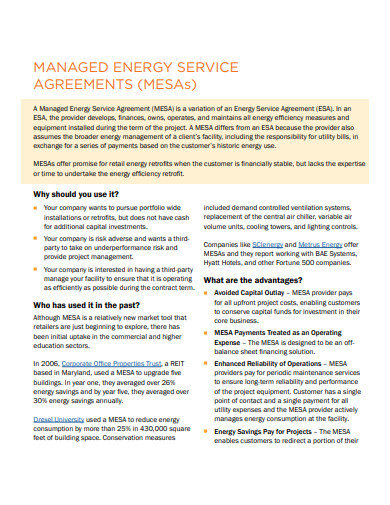
imt.org
Details
File Format
PDF
Size: 390 KB
6. Network Managed Services Agreement Contract
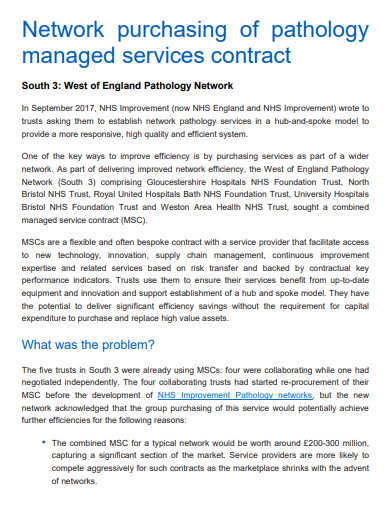
improvement.nhs.edu
Details
File Format
PDF
Size: 34 KB
7. IT Managed Services Agreement Contract
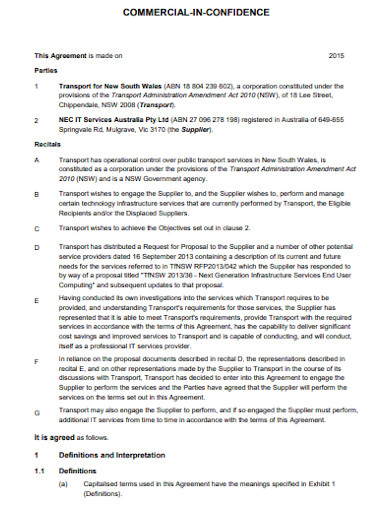
transport.nsw.gov
Details
File Format
PDF
Size: 525 KB
8. Management and Administrative Services Agreement
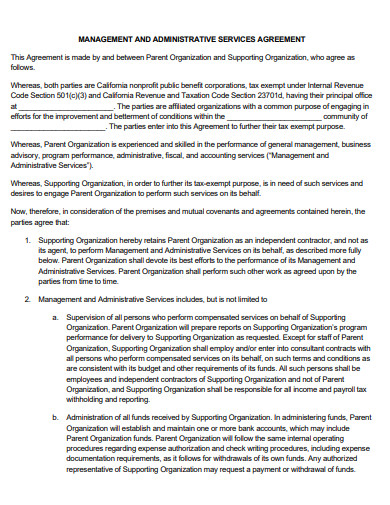
insightcced.org
Details
File Format
PDF
Size: 56 KB
9. IT Managed and Continuity Services Agreement Contract
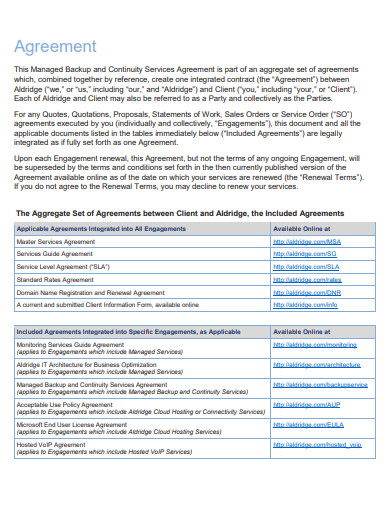
aldridge.com
Details
File Format
PDF
Size: 116 KB
10. Sample Managed Services Agreement Contract
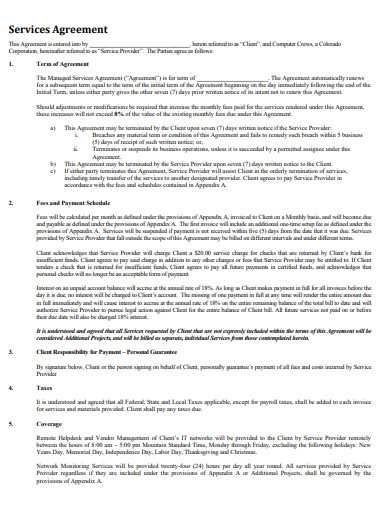
computercrews.com
Details
File Format
PDF
Size: 105 KB
What Is a Managed Services Agreement Contract?
A managed services agreement contract is a process document that presents and explains a business arrangement between an MSP and its client. The Arts Law Centre of Australia described such a document as a list of promises made by the involved parties. It can be done orally or in written form. The same source affirmed that the latter is the best form with inclusions of signatures of both parties’ representatives. Since the paperwork takes note of the participants’ pledges, its primary function is to protect both the MSP and its client from any form of infringement, making it very important for both of them.
Useful Tips in Contracting
1. Do not sign a contract that you do not understand. The lack of knowledge of the process that you’re getting into can cause significant complications, mostly to your disadvantage. So before signing any, make sure to conduct some research.
2. Don’t sign a contract that you don’t agree with. Mutual agreement between the participants is required for the document to be considered a legal contract. Therefore, you have to make sure that every specification is accepted.
3. Avoid making promises you can’t give. Failure to accord with what’s being promised is a breach of contract. It can lead to disputes which may require costly indemnifications to the non-breaching party. Also, contract fiascos can damage your reputation.
4. Opt for written contracts. As mentioned above, contracting can also be done verbally. However, it provides inadequate proof, making it ineffective in implementing dispute resolution policies. With written contracts, you’ll get to make procedure documentation and performance documentation, which are good verification tools.
5. Save a copy of the process document. Given that contracts are used to protect the participants’ rights on a business arrangement, they must hold multiple copies of the paperwork.
How To Create a Managed Services Agreement Contract
Writing contracts need to be done carefully. The party who made the contract offer has to ensure that the document incorporates the standard-based areas. Also, they have to ensure their conciseness and accuracy. To help you create your planned managed services agreement contract, we’ve prepared our ready-made outline that you can refer to.
1. Give Out the Contract’s Purpose
An MSP offers many services, such as managed networks and infrastructure, managed security, managed support services, and more. Each of these services resolves different issues. So as you write your contract, make sure to start by giving out what type of managed services is being requested by the client. Moreover, contracts can be a service agreement contract, purchase agreement contract, sponsorship contract, a rental contract, or an investment contract. Decide which of these types your contract falls under.
2. Name the Parties
As per the standard documentation procedure, you must not forget to provide the complete names of involved parties. Along with this information, you should be addressing your organization as the contractor and the other party as the client on the later part of your document.
3. Elaborate the Service Offer
After naming the parties, start elaborating on what the requested services include. If your client called for a managed cloud infrastructure service, define what the problems are being experienced in online computations, storage, network, and information technology systems. Then, describe how your organization can resolve the issue.
4. Present Provisions
Once you have successfully elaborated on the service offer, present your company’s terms and conditions. This section should consist of the service’s work schedules, equipment and materials, and a brief overview of how the service will be rendered. Agreement on the ownership of resources should also be discussed in this part.
5. Set Payment Stipulations
You can’t complete your managed services agreement contract without the full details of the payment. Right after presenting the service provisions, set your payment stipulations. In doing so, you must take into account the total cost of the service and how and when the payment will be delivered.
6. Expound the Termination Clause
We never know what can go wrong in your contract. Though we all hope for the contract’s success, it’s better to be prepared with a back-up plan in case things go off-course. This is why a termination clause should be included. It is in this part of your contract where you expound how both parties can get out of the contract if one party failed to comply with the agreed obligations.
FAQs
What are the different types of Managed Services?
Managed Services Providers (MSP) may or may not offer all services. Some only specialize in one. Regardless, it’s best to know the different types of managed services. They consist of the following:
1. Managed Networks and Infrastructure
2. Managed Security
3. Managed Support Services
4. Managed Print Services
5. Managed Cloud Infrastructure
6. Managed Software as a Service (SaaS)
7. Managed Wireless and Mobile Computing
8. Managed Communication Services
9. Data Analytics
10. Managed IT Support
11. Cloud-Based Managed Services
How large is the market for managed services providers?
The global managed services market stood at USD 178.5 billion in 2019 and is expected to grow to USD 309.4 billion by 2025.
What are the biggest managed services companies?
1. All Covered
2. Burwood Group, Inc.
3. Managed Solution
4. Mind Shift
5. Coretillegent
It’s amazing how many people find ways to make use of their talents in information technology. Through their imaginative minds, entrepreneurs and employees alike are experiencing the utmost convenience in performing tasks and improving businesses. Just as Albert Einstein said, “Imagination is more important than knowledge. For knowledge is limited, whereas imagination embraces the entire world, stimulating progress, giving birth to evolution.”

